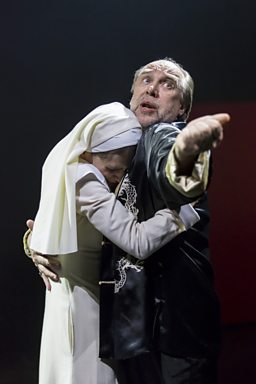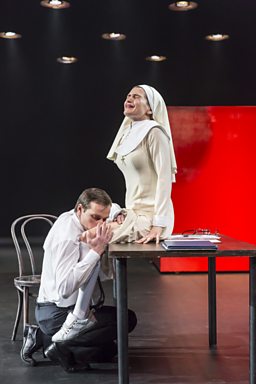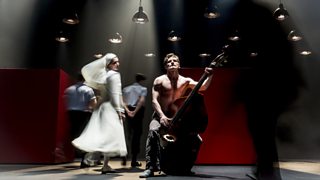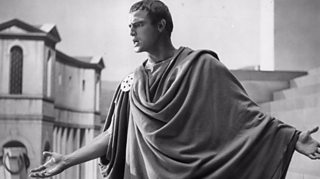Cheek by Jowl & Pushkin Theatre Moscow's Measure for Measure
The 2016 Edinburgh International Festival is celebrating the influence of Shakespeare and re-interpretations of his work, to mark 400 years since his death. We're taking a closer look at three productions from countries which historically have embraced Shakespeare's works; France, Russia and Germany.
In the second of our three Edinburgh articles, Declan Donnellan tells us about Cheek By Jowl's , a collaboration with Moscow's Pushkin Theatre - which opens at the festival on Tuesday 16 August and runs until 20 August.
Declan Donnellan is co-founder and joint Artistic Director of Cheek by Jowl, with designer Nick Ormerod.
-
![]()
Measure for Measure from Britain’s Cheek by Jowl and Moscow’s Pushkin Theatre is a gripping, compelling production of one of Shakespeare’s most controversial plays.
-
![]()
A delirious French-language pop-theatre rethink of Twelfth Night from British-born director Dan Jemmett and his theatre company Eat a Crocodile.
Production Photos - Measure for Measure
Declan Donnellan on Shakespeare and Measure For Measure...
Shakespeare is only popular in countries where people are interested in people.
Shakespeare is only popular in countries where people are interested in people
In Russia people seem to be fairly obsessed with people. Most Russian theatre goers want their theatre to be alive and human and have many words to express these qualities.
And we gave them Shakespeare and they gave us Chekhov. Shakespeare’s plays are full to the brim with ideas, philosophies and politics, but always mediated through people.
We never ever know what Shakespeare thought himself. And that is because everything in his theatre is incarnated through individuals, through characters, through people.
It’s rather difficult to say anything definitive about Lady Macbeth, because the more you get to know her (and the more you get to know yourself), she changes
All of them born absolutely different, and just like a living person, whenever you get to know them better they seem to change slightly.
It’s rather difficult to say anything definitive about Lady Macbeth, because the more you get to know her (and the more you get to know yourself), she changes.
Although Elizabethan theatre toured in Eastern Europe, Shakespeare first swept the continent in a big way at the end of the eighteenth century.
France, Germany, Poland, and Russia all fell under the influence of this dramatist who would free them from the despotism of the three unities and courtly entertainment to a brave new world of freedom, freedom, freedom…
Shakespeare first swept the continent in a big way at the end of the eighteenth century
Young intellectuals like Pushkin thrilled to this and wrote as an homage to Shakespeare’s history plays, but the critics were underwhelmed and he never wrote another. His one effort remains a masterpiece entirely inspired by Shakespeare.
Later on Stanislavski ran into big problems staging Shakespeare at the , but always his spirit was revered. Chekhov joked about fakes pretending to have read Shakespeare.
Stanislavski ran into big problems staging Shakespeare at the Moscow Arts
But suddenly successful productions appeared, followed by Yan Frid’s and then in 1964 the great – all these proved so popular at the time that they have now actually entered the Russian consciousness at a deep level.
Measure for Measure is an intensely political play. Although Shakespeare always puts people before ideas, in most plays we are asked to consider how the state is run.
In Shakespeare the two are indivisible - he never just presents us with people, he always presents us with ‘people in a predicament’. Which is basically what we are. Animals who are partially aware of our predicament and occasionally capable of transcending it, yes even with joy.
Any bad film tells us to shun evil people, but Measure for Measure implies that we should probably give a wide berth to saints as well. Angelo is not a corrupt man pretending to be pure. He is corrupt because he thinks he IS pure. Purity is its own corruption, because pure is what we are not.
Any bad film tells us to shun evil people, but Measure for Measure implies that we should probably give a wide berth to saints as well
We have impulses to do good and impulses to do bad and it is a lot better if we do more of the first.
None of us is ‘pure’ of ourselves or indeed ‘evil’ of ourselves, in our very natures.
This is a sentimental delusion. And this sentimental delusion will continue to shed much blood.
Morality, life itself, is a question of what we do. Priests and politicians will often pretend to smudge this, but performers don’t.
This is one of the foundation beams of Measure for Measure and it is a foundation that Russians seem to grasp eagerly.



Measure for Measure and ‘Shame’ / Shaming in Vienna
Measure for Measure is a very modern play about many different things - it’s a play about control and how one of the ways that we are controlled, by not only governments, but by churches and other institutions that seek to control us, is shame. We are controlled by shame. It starts with parents and it develops, and it is an extremely good way of controlling people.

The play looks at how we live within society, what we do in groups - it is about how we police each other, love each other, imprison each other, have sex with each other, how we look after each other, how we punish each other, and how we need each other.
It is about life in the modern city, where we can be completely lost and also found. It is about corruption- not only within the state, but our own capacity to be corrupt.
In this featured section in particular we are introduced to Vienna’s underworld. We see Claudio paraded around the city by the Provost and his men, a sign with ‘Fornicator’ hung about his neck to shame him - and to warn others what will happen if they violate the laws of Vienna’s new deputy...
On Angelo / Angelo’s monologue
It’s not correct to label Angelo as a ‘villain’. Angelo is a ‘good’ person - his character is a brilliant example of how we should be wary of those who believe themselves to be ‘good’ people. That attitude or belief is nearly always narcissistic and that narcissism often holds something much darker - it often disguises somebody who is not very honest with themselves.

Decent human beings are a mixture of good and bad - they have weaknesses, and they can see other people’s weaknesses, but there is a humility there. There is a certain humour, a knowing fallibility, in being a genuine, ordinary person.
Angelo is very vulnerable because he perceives himself as being above other people, he believes he’s a ‘good’ person, that he’s more ‘good’ than other people. He narcisistically believes himself to be above everybody else, ordinary people, who he sees as just ‘sinners’. As we see in Measure for Measure, this is incorrect, he is in fact vulnerable to the same temptations as everybody. The fact that he doesn’t realise this makes him dangerous.
Dance of Death
At a certain point the production shifts form, and the Duke leads all the characters in a kind of medieval ‘dance of death’, in which he as leading character is dressed as a friar. There are many medieval drawings and prints of Death Dances – the film director Ingmar Bergman also, very famously uses this in his movie The Seventh Seal.

Death Dances symbolise the universality of death - no matter one station’s in life, whether Duke, deputy, prisoner or bawd, Death awaits us all.
In our production the Dance of Death initiates the Duke’s telling of his plan to save Isabella, while the plan is simultaneously acted out onstage. With the near constant moving of the chorus onstage there is a sort of death dance that takes place throughout the whole play.
More from Shakespeare Lives
-
![]()
Rio is hotting up for the start of the 2016 Olympics so as the nations come together for this occasion Shakespeare Lives wanted to look at how other countries have interpreted Shakespeare at the movies.
-
![]()
To commemorate the 400th anniversary of the Bard's death, Shakespeare's Globe has assembled an all-star cast to make 37 short films - one for each play - and here's the twist: each lavish 10 minute vignette is made on location in the real setting of each plot.
-
![]()
Whether in songs or dances, serenades or marches, Shakespeare’s plays suggest music at every turn.






